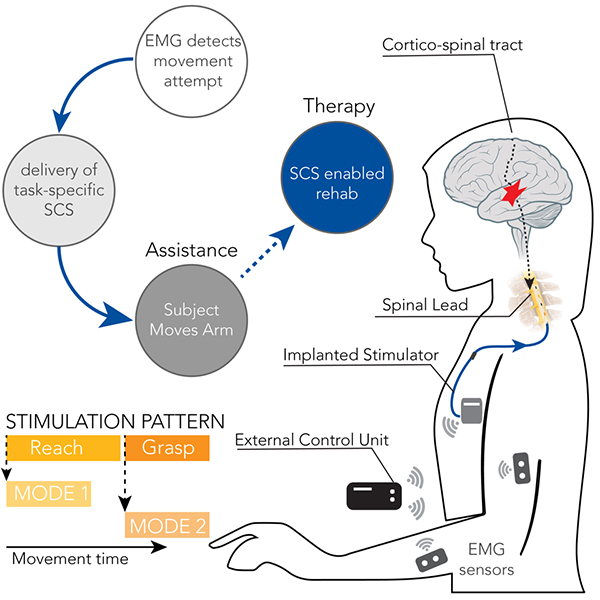The Spinal Cord Stimulation Laboratory, under the direction of Marco Capogrosso, PhD, and part of the University of Pittsburgh Rehab and Neural Engineering Labs, broadly studies the interactions between electrical stimulation and the dynamics of spinal circuits. Specifically, laboratory activities are focused on three areas of interest.
Area 1: Clinical Applications of Spinal Cord Stimulation in Motor Disorders
Dr. Capogrosso applies the results his basic scientific work in translational clinical trials in patients that suffer from motor disorders such as stroke, spinal cord injury and motoneuron diseases. Specifically, he aims to test new implantable technologies to improve motor and sensory functions in people with arm and hand paralysis. He currently has two open clinical trials, one investigating the potential of spinal cord stimulation to restore arm and hand movement after post-stroke hemiparesis, and the second exploring the use of spinal cord stimulation to revert motoneuron degeneration in spinal muscular atrophy.
Area 2: Biophysics of Electrical Stimulation
Dr. Capogrosso uses computational biophysics and modern AI strategies to decipher the computational principles underlying the interaction of artificial electrical stimulation and the neural dynamics of spinal circuits. Specifically, he aims to understand how artificial electrical pulses influence the neural activity of neurons.
Area 3: Electrophysiology of Spinal Circuits and Mechanisms of Neuromodulation
Dr. Capogrosso performs electrophysiology in animal models such as mice and monkeys to understand how the spinal cord and the brain reacts to electrical stimulation. He aims to combine results from computer models with experimental data to optimize neurostimulation technologies and design new effective therapies to motor paralysis.

